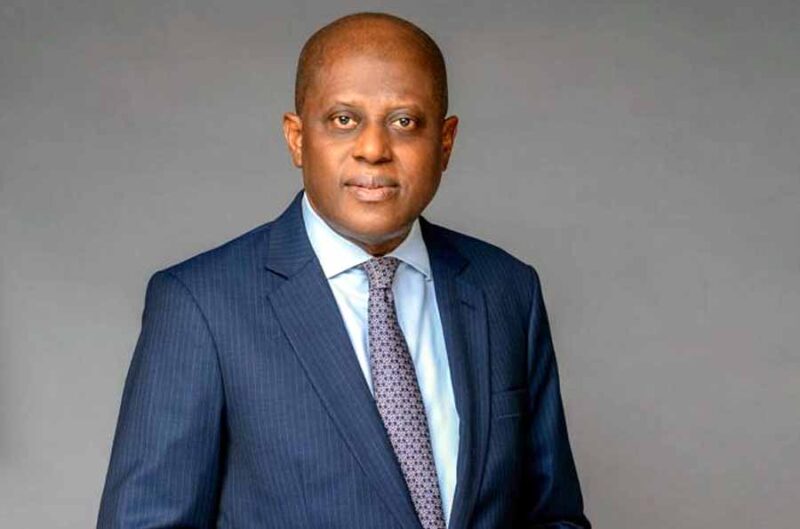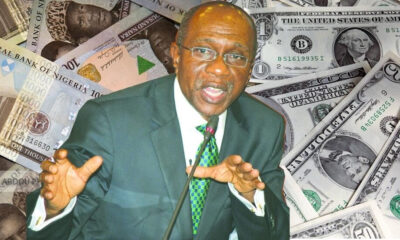Business
CBN to Customs: Adopt official forex rate for import duty

CBN to Customs: Adopt official forex rate for import duty

CBN Governor, Olayemi Cardoso
The Central Bank of Nigeria has told the Nigeria Custom Service to adopt official foreign exchange rate on the date of opening Form M for importation of goods.
This, it said on Friday, should be the foreign exchange rate for Import Duty Assessment with effect from February 26, 2024.
This is contained in a circular to the Customs, all authorised dealers and the general public.
The statement was signed by its Director, Trade and Exchange Department, Dr. Hassan Mahmud.
The advice, it said, was based on the concerns expressed by importers of goods and services on the irregular changes in the import duty assessment levies applied by the NCS.
This was said to have built uncertainty around the pricing structure of goods and services in the economy and creating abnormal increases in the final sale prices of items.
The CBN noted that the rate would remain valid until the date of termination of the importation and clearance of goods by importers.
It said, “Following the liberalization of the FX market on Willing Buyer – Willing Seller trading principle, the CBN has noted the concerns of importers of goods and services in the irregular changes in the Import Duty Assessment levies applied by the NCS.
“These developments have further built uncertainties around the pricing structure of goods and services in the economy and creating abnormal increases in the final sale prices of items, which is largely driven by uncertainties, rather than traditional market fundamentals, with implications to near term inflation trend.
“To this effect, the CBN wishes to advise that the NCS and other related parties adopt the closing FX rate on the date of opening Form M for the importation of goods, as the FX rate to be used for Import Duty Assessment.
“This rate remains valid until the date of termination of the importation and clearance of goods by importers.
“This would enable the NCS and the importers to effectively plan appropriately and reduce the uncertainties around varying daily exchange rate in determining
their revenue or cost structure, respectively.
“Therefore, effective 26th February 2024, the closing rate on the date of opening of Form M for the importation of goods and services would be the rates that would apply for the assessment of import duty.
“This supersedes the requirements of Memorandum 9, J (2) of the Central Bank of Nigeria Foreign Exchange Manual. (Revised edition), 2018.
“While the CBN is mindful of the initial volatility and price distortions in the aftermath of the FX market liberalization, the bank is confident that these reforms, would in the medium term, ensure stability in the market and entrench market confidence necessary to attract investment capital for the growth and development of the Nigerian economy.”
Business
Naira Could Trade Below ₦1,000/$ With Dangote Refinery at Full Capacity — Otedola

Naira Could Trade Below ₦1,000/$ With Dangote Refinery at Full Capacity — Otedola
Billionaire businessman Femi Otedola has projected that the naira could strengthen to trade below ₦1,000 per US dollar as the Dangote Petroleum Refinery achieves full operational capacity. The prediction comes as Nigeria anticipates a major boost in domestic fuel production, potentially reducing import dependence and easing pressure on the foreign exchange market.
Otedola made the projection in a post on X, congratulating Aliko Dangote on the refinery reaching its designed processing capacity of 650,000 barrels per day (bpd). He described the milestone as a historic moment for Nigeria’s energy sector, saying it could positively impact the naira exchange rate, foreign reserves, and overall economic stability.
According to Otedola, the refinery’s capacity to produce up to 75 million litres of Premium Motor Spirit (PMS) daily positions Nigeria to meet domestic fuel demand and even generate surplus for export. He highlighted that this would reduce the country’s reliance on imported petroleum products, which historically exerted heavy pressure on the naira and foreign exchange resources.
READ ALSO:
- Adeyanju Urges EFCC, DSS to Probe El-Rufai Over Alleged Corruption, Insecurity in Kaduna
- Granite-Laden Truck Kills Motorist, Leaves Wife Critically Injured in Lekki–Ajah Crash
- City Boy Movement Receives Bus Donations from Zenco, Obi Cubana for Tinubu’s Campaign
“With domestic refining now firmly underway after decades of reliance on imports, pressure on the foreign exchange market should ease significantly, potentially pushing the naira below ₦1,000/$ before year-end,” Otedola said. He also noted that the EFCC and monetary authorities’ support in maintaining a conducive economic environment would complement these gains.
The Dangote Refinery, located in the Lekki Free Zone, Lagos, is Africa’s largest single-train refinery. Experts say that reaching full production will conserve billions of dollars previously spent on importing refined petroleum products and strengthen Nigeria’s foreign exchange reserves. Plans are also underway to expand refining capacity to 1.4 million bpd, with increased production of petrochemicals like polypropylene and linear alkyl benzene, further reducing industrial import dependence.
Economic analysts have welcomed the refinery’s milestone but caution that naira stability will still depend on broader macroeconomic reforms, oil prices, foreign capital inflows, and Central Bank of Nigeria (CBN) policies. Nevertheless, Otedola’s projection reflects renewed optimism that domestic refining capacity could be a turning point for the Nigerian economy, energy security, and the foreign exchange market.
Naira Could Trade Below ₦1,000/$ With Dangote Refinery at Full Capacity — Otedola
Business
Dangote Refinery Slashes Petrol Price to ₦774, Ends PMS Bonus Window

Dangote Refinery Slashes Petrol Price to ₦774, Ends PMS Bonus Window
Dangote Petroleum Refinery and Petrochemicals FZE has announced a reduction in the gantry price of Premium Motor Spirit (PMS), commonly known as petrol, by ₦25 per litre, lowering the ex-depot rate from ₦799 to ₦774 per litre. The new pricing took immediate effect on Tuesday, 10 February 2026.
The refinery notified petroleum marketers through its Group Commercial Operations Department, stating:
“This is to notify you of a change in our PMS gantry price from ₦799 per litre to ₦774 per litre.”
Industry checks on platforms like petroleumprice.ng confirmed that the revised price has already been updated across petroleum pricing systems, ensuring transparency for downstream operators and consumers.
In the same notice, Dangote Refinery announced the end of its PMS lifting incentive programme, which had offered marketers bonuses for purchasing within specific volume thresholds. The refinery stated that credits for volumes loaded from 2 to 10 February 2026 would be posted to marketers’ accounts.
READ ALSO:
- El-Rufai: I Supported Tinubu Out of Party Principle, Not Friendship
- Trump Approves Deployment of 200 U.S. Soldiers to Support Nigeria’s Fight Against Terrorists
- Atiku Rejects Mixed Result Transmission
Analysts say the simultaneous price cut and closure of the bonus window signals a shift from volume-driven incentives to a more stable and predictable pricing framework, as the refinery consolidates its domestic market share.
The move comes amid continued volatility in PMS prices following the full deregulation of Nigeria’s downstream petroleum sector and the removal of fuel subsidies. In 2025, ex-depot prices fluctuated between ₦700 and over ₦800 per litre, driven by exchange rate pressures, global crude oil prices, and reliance on imported fuel, which in turn pushed pump prices higher nationwide.
With a production capacity of 650,000 barrels per day, Dangote Refinery — Africa’s largest single-train refinery — has become a key reference point for domestic fuel pricing. Its operations have helped moderate petrol prices, especially in southern and coastal distribution corridors, and reduce Nigeria’s dependence on imported fuel.
Industry observers note that the latest price reduction reflects easing production costs, improved operational efficiency, and increased competition from imported cargoes and modular refineries. As the refinery continues to expand, its pricing decisions are expected to influence national petrol rates, transportation costs, and inflationary pressures.
Dangote Refinery Slashes Petrol Price to ₦774, Ends PMS Bonus Window
Business
Fuel Self-Sufficiency: Dangote Refinery Counters Misinformation on Petrol Imports

Fuel Self-Sufficiency: Dangote Refinery Counters Misinformation on Petrol Imports
The Dangote Petroleum Refinery & Petrochemicals has clarified that there is no importation of finished Premium Motor Spirit (PMS) — commonly known as petrol — into Nigeria, countering recent reports suggesting otherwise. The company stated that locally refined petrol from the Dangote Refinery now meets a significant portion of Nigeria’s domestic demand, marking a major milestone in the country’s journey toward fuel self-sufficiency.
In a statement, the refinery dismissed claims that it imports finished PMS as false and misleading, stressing that such reports misrepresent its operations and could undermine public confidence in Nigeria’s local refining sector. The company also indicated that it has identified individuals behind these claims and warned that legal action may be pursued against parties spreading misinformation.
Oil marketers and industry observers confirm that the refinery has consistently supplied petrol to the Nigerian market, reducing reliance on imported fuel. The move has been welcomed by stakeholders, including the Independent Petroleum Marketers Association of Nigeria (IPMAN), which advised its members to prioritize purchasing petrol from Dangote’s facility to support domestic refining and strengthen local fuel supply chains.
READ ALSO:
- “Electoral Act Amendment: El-Rufai Calls Akpabio ‘Tinubu’s Lapdog’”
- Lookman Reflects on Bittersweet La Liga Debut as Atletico Madrid Fall at Home
- Fayose Claims Presidency Told Wike to Respect Fubara or Risk Losing Job
This announcement comes amid broader efforts to revamp Nigeria’s state-owned refineries. Talks are ongoing between the Nigerian National Petroleum Company (NNPC) and technical partners to enhance capacity at existing refineries, aiming to further reduce the country’s dependence on imported petroleum products.
Analysts say that the rise of local refining through Dangote’s facility is poised to have several benefits for Nigeria, including stabilizing fuel supply, saving foreign exchange, and potentially moderating fuel prices. As the refinery ramps up production, Nigerians can expect more reliable access to locally refined petrol, signaling a shift from historical dependency on imported fuel toward greater energy self-reliance.
The Dangote Refinery, now one of the largest in Africa, continues to deliver substantial volumes of petrol and other refined products across Nigeria, underlining its central role in the country’s energy infrastructure and the nation’s ambition to achieve self-sufficiency in petroleum products.
Fuel Self-Sufficiency: Dangote Refinery Counters Misinformation on Petrol Imports
-

 metro19 hours ago
metro19 hours agoIKEDC Sets Feb 20 Deadline for Customers to Submit Valid IDs or Face Disconnection
-

 Education20 hours ago
Education20 hours agoSupreme Court Affirms Muslim Students’ Right to Worship at Rivers State University
-

 metro3 days ago
metro3 days agoFormer NAHCON Chief Explains Why He Stepped Down, Denies Conflicts
-

 Business2 days ago
Business2 days agoDangote Refinery Slashes Petrol Price to ₦774, Ends PMS Bonus Window
-

 metro2 days ago
metro2 days agoKwara, Katsina Bloodshed: TMC Condemns Attacks, Dismisses ‘Jihadist Preacher’ Claims
-

 Business22 hours ago
Business22 hours agoNaira Could Trade Below ₦1,000/$ With Dangote Refinery at Full Capacity — Otedola
-

 News3 days ago
News3 days agoLagos Announces Four-Week Partial Closure of Lagos-Abeokuta Expressway
-

 metro3 days ago
metro3 days agoGovernor Peter Mbah Orders Closure of Bet9ja Operations in Enugu















